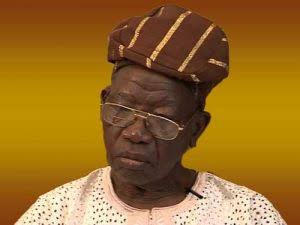Momoh Jakande: Great loss to Nigerian press

By Dons Eze, PhD
A great tragedy has befallen the Nigerian Press. Two big irokos, Tony Momoh – erudite scholar, essayist, newspaper administrator and politician; and Lateef Kayode Jakande, journalists’ journalist, newspaper administrator and politician, all fell in quick succession – in the month of February, 2021.
Tony Momoh died on February 1, while Jakande died on February 11. February, what did the Nigerian Press do to you? Why pluck the two giants out of our midst? We are in deep mourning. We are in pains. We are in sorrow. We are grieving. The flag of Nigerian Press is now flying at half mast, in honour of these two icons of Nigerian journalism.
Tony Momoh and Lateef Jakande were among the finest journalists Nigerian Press had produced. They helped to make Nigerian Press tick. They helped to make it active and vibrant in spite of the long years of military rule in the country. They helped to chart the course of Nigerian journalism. They helped to make Nigerian Press the best in Africa.
Lateef Jakande, editor extraordinaire, and excellent news producer, entered the field of journalism in 1943, when he began editing The Quarterly Mirror, while still a student. He went on to embrace full-time journalism career in 1949, when he joined the Daily Service Newspaper, and from there, began editing the Nigerian Tribune Newspaper, before establishing his own newspaper.
Jakande was the first African to become Chairman of the Executive Board of the International Press Institute (IPI), from 1972 to 1974. He became a member of IPI Executive Board in 1961, and in 1968, the Vice Chairman of the Board.
As a member of IPI Executive Board, Lateef Jakande used the position to influence the establishment of Nigerian Institute of Journalism (NIJ) in Lagos, in 1963, which saw to the strengthening of journalism profession in Nigeria, and the training of professional journalists in the country.
Lateef Jakande made his mark in politics, and shone like a million stars, when he served as Governor of Lagos State, between 1979 and 1983. He was adjudged as the “Best Governor” of the time. This, perhaps, shows that a good journalist can equally make an excellent politician.
Tony Momoh, who entered journalism in 1962 as sub-editor with the Daily Times of Nigeria, but later took sabbatical in 1964, to study Mass Communication at the University of Nigeria, Nsukka, was among the pioneer university graduates who practised journalism in the country, and he had helped to steer it to the right path.
As an intelligent and reflective journalist, Tony Momoh wrote incisive and punchy articles that caused stir and discomfort to those in authority, while stoutly defending the right of journalists to source and disseminate information, without let or hindrance, but not disclosing the source or sources of information.
In 1981, as Editor of Daily Times, Tony Momoh was summoned by the Nigerian Senate led by Joseph Wayas for contempt. This caused a major legal battle in which Tony Momoh successfully argued that as a journalist, he was empowered by the Constitution of Nigeria to hold government accountable at all times.
Also, in a legal battle between Tony Momoh and the Speaker of the House of Representatives, in 1982, the Court held that a person had the right to refuse to disclose the source of his information, even though the Court of Appeal, in Senate versus Tony Momoh (1983), was to hold that the press was not a fourth arm of government, and that a newspaper publisher had no special immunity, while the press could be ordered to disclose its sources, in some cases.
That, notwithstanding, Tony Momoh had defended his right, and by extension, opened the eyes of many practising journalists in the country to recognize their role as a Socratic gadfly, that has the responsibility of stirring the state to action, acting as society’s watchdog, and always holding the government accountable.
Even when circumstances had made Tony Momoh to switch camp, when he was appointed Minister of Information and Culture under the Babangida military regime, he did not totally abandon his constituency, the Nigerian press, but began writing “Letters to My Countrymen”, strenously struggling to defend an autocratic military dictatorship.
As Minister of Information and Culture, Tony Momoh chaired the African Conference of Information Ministers from 1988 to 1990, and was also a member of the Nigerian Press Council in December 1992.
Today, Tony Momoh and Lateef Jakande are no more. They have bowed out. They had made their mark. They held the light, and we saw through them. These were men who practised journalism the way it should be practised, who held the ethics of journalism at the tip of their fingers. It was not like nowadays when anybody who could afford a smartphone would be parading as journalist, posting all sorts of rubbish to the public.
Adieu, great Titans of Nigerian journalism.

